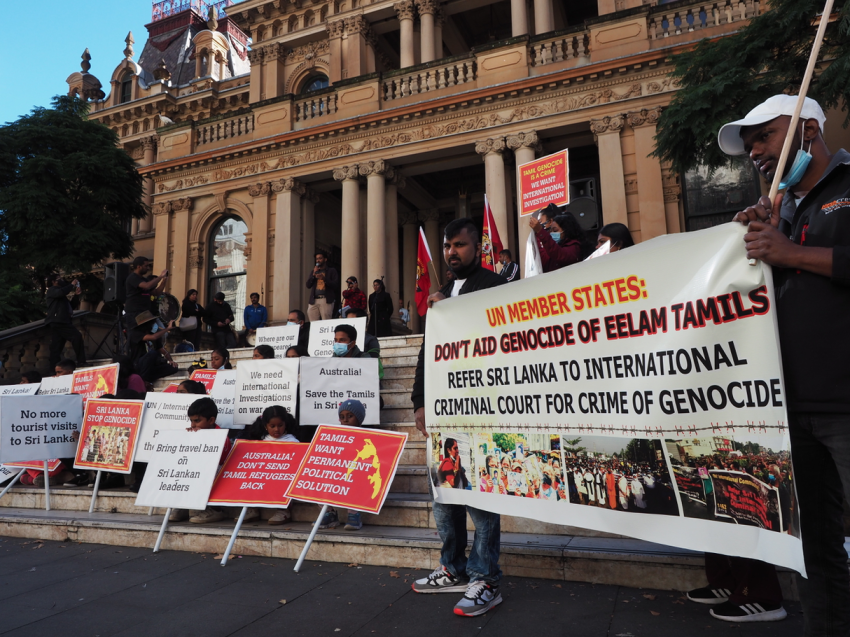
More than 100 people gathered in Sydney and a similar number in Melbourne on Tamil Remembrance Day on May 16.
In 2009, the Sri Lankan military turned the beach of Mullivaikal into a war zone as it trapped and slaughtered tens of thousands of Tamils who had fled from the advancing Sri Lankan army. They were bombarded from land, sea and air. The death toll is unknown, but a 2012 United Nations report estimated that 70,000 people were killed.
In Sydney, Barathan Vidhyapathy said more than 100,000 Tamils were killed and that those in charge of that massacre are now in government and have put the north-east of the country “under military occupation”. “This is why we protest today, mourning the dead and fighting like hell for the living.”
Kathirini, a Tamil refugee and survivor spoke about the day. “I was a child, and two relatives were sitting in my front garden. A shell blasted our yard and we lost a family member instantly, the other went straight to hospital. People were blown up in front of our eyes.”
Bruce Haigh, a former diplomat, said the Australian government “didn’t want to report on the war against the Tamil people” and nor was it “interested in helping Tamil refugees, or any other refugees”, referring to Priya and Nades and their two daughters who are still locked up on Christmas Island.
Renuga Inapkumar from the Tamil Refugee Council said the war on Tamils was continuing. “There were so many atrocities. Women and children were raped and executed … This fight and the trauma won’t be over till these criminals are tried for what they’ve done.”
Muruwari and Budjiti man Uncle Bruce Shillingsworth acknowledged country. Former NSW Senator Lee Rhiannon, Palestinian rights activist Damien Ridgwell and Hersha Kadkol from Socialist Alternative also spoke.
In Melbourne, Tamil Refugee Council member Sathya Thavendran said the military occupation of traditional Tamil lands in the north and east of Sri Lanka must end. She called on the federal government to recognise that Tamils are persecuted and had a right to seek asylum.
Thavendran said north-eastern Sri Lanka is one of the most heavily militarised areas in the world, with one soldier of the occupying Sri Lankan army for every six inhabitants. She said the surveillance, torture and murder had not stopped.
Thavendran demanded an end to military occupation of traditional Tamil lands. She called on the Australian government to recognise the persecution of Tamils and accept their right to seek asylum.
First Nations' activist Robbie Thorpe compared the genocide against the Tamils with the genocide against the First Nations people.
Pavithiran Sivanathan, a survivor of the Mullivaikkal massacre who came to Australia by boat, described the experience of living under indiscriminate bombing and shelling, first in his home town, then while fleeing towards the coast.
Maryam Naleemuddeen, a Muslim woman from Sri Lanka, spoke about how the government, which has a long history of oppressing Tamils, is now attacking Muslims.
Aung Soe Naing, a Rohingya man, spoke about the similarity between the genocidal policies in Sri Lanka and Burma. He said Australian companies have investments in both countries and the government supports the military in both countries.
Senthuran Mahendran, a lawyer assisting in the defence of the Tamil family who were taken into detention after living in Biloela in Queensland and are now held on Christmas Island, said that Australia’s cruel treatment of Tamil refugees perpetuates the crimes committed overseas.
Chloe DS from Socialist Alliance said the Tamils must have the right to self-determination and said the federal government must stop collaborating with the Sri Lankan army and police, and forcibly returning Tamil refugees.
Mick Armstrong from Socialist Alternative also spoke, as did a representative of Union Aid Abroad-APHEDA.
The protests called on the Sri Lankan government to end its military occupation; end the land grabs; recognise the right to be buried there; and to release all the prisoners of war. It also called on the federal government to stop navy and military support for Sri Lanka.